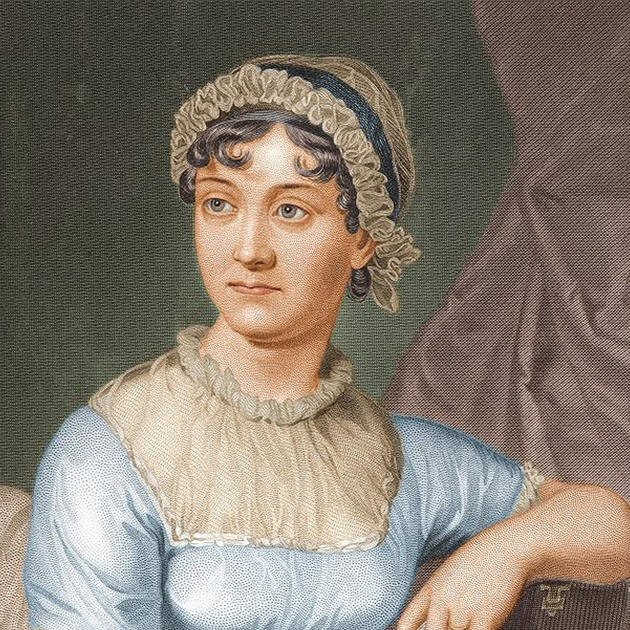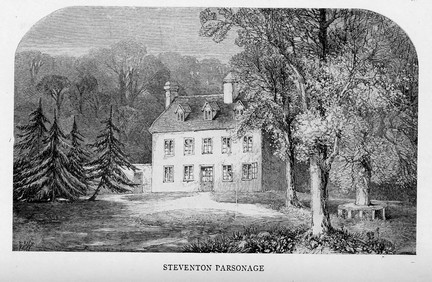Austen, Jane Contents
Jane Austen's early life
Beginnings at Steventon
 Jane Austen was born on December 16, 1775, at the rectory in the quiet village of Steventon in Hampshire. She spent most of the first twenty five years of her life there. She lived a very local life, mostly in the society of family and friends. Her novels demonstrate an outstandingly keen observation and understanding of human behaviour, so universally appreciated that her novels have been translated into many languages and have never gone out of print.
Jane Austen was born on December 16, 1775, at the rectory in the quiet village of Steventon in Hampshire. She spent most of the first twenty five years of her life there. She lived a very local life, mostly in the society of family and friends. Her novels demonstrate an outstandingly keen observation and understanding of human behaviour, so universally appreciated that her novels have been translated into many languages and have never gone out of print.
Parents
Jane’s father, George Austen, was a member of the gentry. Although orphaned at age 6, he was well-educated and became rector of Steventon in 1768, four years after marrying Jane’s mother, Miss Cassandra Leigh, who was also from a distinguished family.
Family life
The Austens had eight children:
- James (1765-1819)
- George (1766-1838)
- Edward (1767-1852)
- Henry (1771-1850)
- Cassandra (1773-1845)
- Francis (1774-1865)
- Jane (1775-1817)
- Charles (1779-1852).
Jane Austen’s relationships with her siblings sometimes afforded her glimpses into worlds beyond her own:
- Edward was adopted by the wealthy Knight family, which gave Jane access to the world of the landed gentry
- Henry was a soldier before he became a banker and finally a clergyman
- Francis and Charles both entered the Navy and rose to the rank of Admiral, giving Jane a window into the lives of naval officers.
 With their own children and the four or five boys that the Rev. Austen took in as boarding students to supplement the family’s income, the household that Jane grew up in was very full and lively. The Austens were close-knit and happy, enjoying many of the pastimes that feature in Jane Austen’s novels, such as visiting with friends and family, long walks, trips to nearby towns, shopping, playing the piano, dancing, as well as holidays in Bath and Kent.
With their own children and the four or five boys that the Rev. Austen took in as boarding students to supplement the family’s income, the household that Jane grew up in was very full and lively. The Austens were close-knit and happy, enjoying many of the pastimes that feature in Jane Austen’s novels, such as visiting with friends and family, long walks, trips to nearby towns, shopping, playing the piano, dancing, as well as holidays in Bath and Kent.
Faith
The daughter of an Anglican clergyman, Jane Austen attended church regularly and was sincere in her Christian faith. She subscribed to the 39 Articles, and was very familiar with the Book of Common Prayer and the Bible. Her novels are renowned for highlighting the value of practising Christian morals, whilst also pointing out the shortcomings of some clergy!
Education
Jane Austen was educated at home until she was seven years old. In 1783, she was sent with her sister Cassandra and cousin Jane Cooper to boarding school in Oxford. Their time there was cut short by an outbreak of typhoid. After a short stay at home, the sisters were then sent to Abbey School in Reading. They returned home again in 1786 as Jane’s father was no longer able to afford the tuition fees.
Thereafter, Jane and her sister received no further formal education but were largely self-educated with some assistance from their father and older brothers. Jane’s parents were both articulate and intelligent and encouraged their children to exercise their intellects:
- Austen read widely. With no apparent censorship, and with full access to her father’s 500 volume library, reading became a crucial part of her education. Reading is an enduring motif in her novels, and functions as a gauge of good judgment
- She took an interest in amateur theatricals. As early as age seven, Jane enjoyed watching her older siblings and the boys from her father’s school perform plays at home. She may have participated in the family performance in 1784 of Sheridan’s comedy of manners, The Rivals
- There was a lot of lively family conversation on numerous topics, no doubt shaping her ability to view an issue from all sides and to examine its strength and weaknesses.
Novelist-in-training
By the time she was twelve, Jane Austen had already begun to write prolifically, mostly for the entertainment of her family and friends. She copied her favourite pieces into three notebooks which are known as her juvenilia. The three volumes contain works in a wide variety of genres written between the ages of 12 and 18. Austen’s use of satire throughout these youthful works is remarkable. Among other things, she parodied poems, plays, histories, memoirs, textbooks, conduct books and sentimental fiction. Her burlesque is cleverly heightened by:
- A large number of melodramatic events such as murders, duels, elopement, drowning, fainting, and robberies
- Exaggeratedly romantic language, juxtaposed with violent outbursts
- Heroes and heroines whose behaviour flouts convention and who find themselves in outrageously compromising predicaments.
Clearly Austen had found her voice at a very young age. In her juvenilia we see her exercising her distaste for hypocrisy, meaningless social convention and sentimentalism through her early subversion of literary genres.
The first novels
At age 21, Jane Austen began work on Sense and Sensibility, the first of the three novels she was to draft at Steventon. It was only two short years since she wrote the last of the pieces that are included in her juvenilia, but these novels demonstrate a much more mature style and voice. Austen is far more subtle and sophisticated in her exposure of societal hypocrisy, comments on morality, extensive use of irony and clever dialogue. The characters have greater depth and dimension, and the plots are more realistic. She abandons the slapstick elements of her juvenilia entirely. Along with the themes of manners, morality and marriage that recur throughout her novels:
- Sense and Sensibility contrasts the qualities of restraint (as evidenced in Elinor) with the quality of passion (as evidenced in Marianne)
- Pride and Prejudice explores the place of pride in Elizabeth and Darcy’s misjudgments of one another, highlighting the discernment that is necessary in the accurate judgment of character
- Northanger Abbey presents the themes of reality and illusion through Catherine’s journey towards understanding her delusions.
